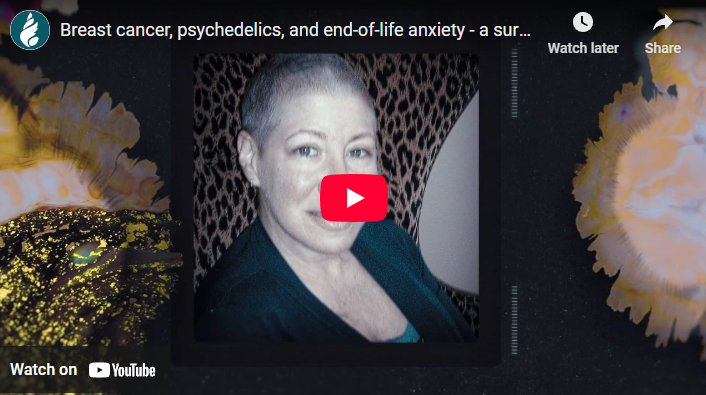Deborah Servetnick was diagnosed with stage three breast cancer in 2011 before becoming a participant in John Hopkins University’s psilocybin study.

Breast cancer doesn’t discriminate–about 1 in 8 women in the U.S. will develop it over the course of her lifetime. In 2020, an estimated 276,480 new cases are expected to be diagnosed in women in the U.S. For women in the U.S., breast cancer death rates are higher than those for any other cancer, besides lung cancer–about 42,170 women in the U.S. will die from it this year.
It is not just the disease that permanently alters the lives of women with breast cancer. The grueling treatment processes, medical expenses, the fear and anxiety of death and dying can compound. In fact, up to 40% of cancer patients often develop a chronic syndrome of psychosocial distress including depressed mood, anxiety and reduced quality of life. The impact that chronic depression and anxiety has on cancer patients cannot be understated. It often results in decreased treatment adherence, prolonged hospitalization and increased suicidality. Of course, traditional antidepressants and even benzodiazepines can be used to treat depressed mood and anxiety in cancer patients, but they are generally a short-term reprieve due to the side effects and the impact of the withdrawal period.
Over the past few years, there have been several promising interventions using classic hallucinogens, including psilocybin, to decrease depression and anxiety in cancer patients. In 2016, a landmark double-blind study conducted by Johns Hopkins University recruited 51 cancer patients with life-threatening diagnoses and symptoms of depression and anxiety to test the power of psilocybin.
The researchers found that a substantial majority of people suffering cancer-related anxiety or depression experienced considerable relief for up to six months from a single large dose of psilocybin.
Six months after the final session of treatment, about 80% of participants continued to show clinically significant decreases in depressed mood and anxiety.
83% percent reported increases in well-being or life satisfaction.
67% of participants reported the experience as one of their top five meaningful experiences in their lives (among the birth of a first child and getting married).
70% reported the experience as one of the top five spiritually significant lifetime events.
Ultimately, the study demonstrated that psilocybin produces substantial and sustained decreases in depression and anxiety in patients with life-threatening cancer. Deborah Servetnick was one of the participants in this study.
Deborah Servetnick was diagnosed with stage three breast cancer in 2011. She felt desperate, depressed and lost. She grappled with thoughts about how her experience with cancer was justification that her life wasn’t too easy–she questioned her worthiness of living a good life. When Deborah was considering becoming a participant in the study, she recognized that although she had had a few psychedelic experiences when she was younger, she hadn’t experimented in decades.
Once she began the psilocybin study, everything changed. She felt that she did deserve a life worth living and basked in the realization that everything is connected. As she states, “If I hadn’t gotten into this Johns Hopkins study, I can’t even imagine what my life would be like…it really saved my life.” While it took her years for her “chemo brain” to recover, she believes that her recovery was due to psychedelics. In fact, as Deborah put it, “Almost all of the problems that I had during cancer were from prescription drugs. I encountered no side effects from psilocybin, except I felt so much better.”
Deborah’s story and the scientific data garnered from this Johns Hopkins study is a testament to the healing power of psychedelics, including psilocybin. And this is just the beginning–we have only scratched the surface of the unlimited potential of psychedelic research and science. As Deborah concluded, “Psilocybin has its own infinite intelligence and we’re meant to bring it into our lives.”
Deborah lives in Baltimore with her husband and daughter and has become an advocate for psychedelic science. She currently resides on the leadership team of the Baltimore Psychedelic Society, is an activist with Decriminalize DC, and an integration coach helping others tune into a new way of living. Most importantly, Deborah is happy, healthy and cancer free!
Have you had a life altering experience with psychedelics? We believe that both quantitative data and storytelling are essential to the evolution of psychedelic research. That’s why we’re compiling Psychedelic Diaries™, a collection of video narratives showcasing how psychedelics have transformed people’s lives. If you have a story to share, contact us.
No comment yet.
Join our email list and get immediate access to part one of our psilocybin guide. You’ll also get the latest in how we’re bridging the gap between science and soul: psychedelic research updates, real-world findings, community-driven education, personal stories and expert insights on natural medicine.
Advancing Real-World Psychedelic Research and Science-Backed Education
Unlimited Sciences is provided with a nonprofit status by fiscal sponsorship through Realm of Caring Foundation.
Federal EIN: 46-3371348.
© 2025 Unlimited Sciences. All Rights Reserved.
Designed by Gloss